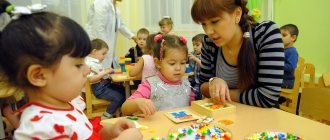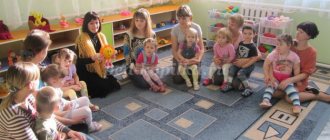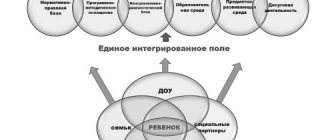The main forms of organizing interaction between preschool educational institutions and families in the context of the Federal State Educational Standard for Preschool Education
The goal of a modern preschool educational institution is the comprehensive formation of a child’s personality, taking into account his physical and mental development, individual capabilities and abilities. But such development cannot occur without close interaction between the preschool educational institution and the family. Family is the first institution in a child’s life.
The further development of the child depends on the joint work of parents and teachers. And it is the quality of work of preschool educational institutions, in particular teachers, that determines the level of pedagogical culture of parents, and, consequently, the level of family education of children. Therefore, modern family and preschool education should not be considered as autonomous areas of preschooler development.
The federal state educational standard for preschool education meets new social demands, one of which is the interaction of a preschool institution with children’s families for more successful implementation of the basic general education program of a preschool educational institution. The Federal State Educational Standard for Preschool Education places new demands on improving the content, forms and methods of interaction between the social partnership of the family and the preschool educational institution, which must be considered as a resource for the sociocultural development of the child.
The Federal State Educational Standard for Preschool Education states that work with parents should have a differentiated approach, taking into account social status, family microclimate, parental requests and the degree of parental interest in the activities of the preschool educational institution. The Federal State Educational Standard for Education is the basis for assisting parents (legal representatives) in raising children, protecting and strengthening their physical and mental health, developing individual abilities and the necessary correction of their developmental disorders.
Today, the leading and organizing role of the kindergarten in relation to the family is characterized by a complex of factors:
- systematic, active dissemination of pedagogical knowledge among parents;
‒ practical assistance to families in raising children;
‒ organizing the promotion of positive experiences in public and family education;
- involving parents in teaching activities.
What forms of organizing interaction between preschool educational institutions and families are relevant today? And the forms can be used as traditional ones:
- parent meetings;
‒ individual consultations at the request of parents with teachers and specialists;
‒ information stands where consulting material is selected on topics of interest;
‒ photo reports and filming of various activities in each group and the entire preschool educational institution.
So and non-traditional:
‒ issues of intra-kindergarten newspapers, on the pages of which parents can share their experience of family education;
- exhibitions of family creativity;
‒ various master classes with the participation of parents;
‒ “feedback diaries”, where teachers and parents tell each other about their children’s achievements;
‒ organization of various joint projects (“School of a Caring Parent”, “Healthy Family”, etc.) in order to solve the problem of strengthening the family as a social unit;
‒ organizing family clubs that allow you to create a situation of success for each family, without exception, and which is accompanied by positive emotions of the participants in the parent-child team, allows you to take into account the individuality of each participant, both adults and children;
‒ using the kindergarten website to inform parents about the activities of the institution, provide advice on various issues, and organize feedback;
- joint holidays with parents and children.
Such forms of work will make it possible to organize a high degree of awareness of parents about the state of affairs in the kindergarten with the aim of better development and education of children not only in preschool educational institutions, but also at home, to intensify the willingness of parents to participate in all areas of the activities of the preschool institution, and to establish a positive psychological climate in relationships “ parents - children - teachers." But the most important thing in organizing interaction between preschool educational institutions and families is to retreat from formalism in organizing this activity. It is necessary to strive for dialogue, take into account the social demand (interests, needs and requirements of parents in matters of development and upbringing of children), organize the “openness” of the preschool institution for parents.
Today, of course, the initiative comes more from teachers, but we can already say that parents are increasingly responding to teachers’ proposals for cooperation and signs of renewal in the interaction of teachers with families are clearly occurring.
Our preschool institution, as part of the implementation of the federal state educational standard for preschool education, pays great attention to interaction with parents (legal representatives) of pupils. Together with the parents, we created a portfolio for each child, which contains the pages “Advise me” and “Ask, parents”, where the parents are
can ask a question that interests them, and specialists working with the child can give recommendations and help in resolving the issue that arises for parents.
Creative workshops with the participation of children and parents also resonated with parents, when mothers and their children demonstrate artistic creativity in productive activities and share their talent with other mothers. Holding joint creative competitions “Sorceress “Autumn”, “Christmas Tale”, “Winter Town” arouses genuine interest among parents and pupils and allows all family members to participate.
Parents of our students are happy to take part in organizing joint theatrical activities, holding “Round Tables” on various topics, and taking part in celebrations and entertainment. The campaigns “Bird Day”, “Tree in the Palms”, “Every Speck in a Basket”, “Joint Environmental Cleanup Day” are held with great desire. All of them are aimed at family cooperation within the framework of not only the formation of an environmental culture, spiritual, moral and patriotic qualities of preschoolers, the development of the child’s personality, but also increasing the responsibility and role of parents in raising their child.
The organization of joint sports events “Autumn Family Marathon”, “Winter Spartakiad”, “Mom, Dad, Me - a Healthy Family” is aimed at creating the foundations of a healthy lifestyle for adults and children, improving the psychological climate of the family and the institution.
Many of these events have become traditional for the kindergarten and parents.
Thus, the use of various forms of interaction between the preschool educational institution and the family - two important social institutions for the socialization of the child - produces positive results. With all their work, the teaching staff of the kindergarten proves to parents that their involvement in teaching activities, their interested participation in the educational process is important not because the teacher wants it, but because it is necessary for the development of their own child. And the implementation of the Federal State Educational Standard for Preschool Education makes it possible to organize the joint activities of the kindergarten and the family more effectively, which allows parents to be not spectators and observers, but active participants in the life of their child.
Literature:
1. Magazine “Preschool Education Management”, 2013.
2. Lyubchik S. A. Basic forms of organizing interaction between preschool educational institutions and families / Preschool educational institutions management. 2013. No. 6.
3. Federal state educational standard for preschool education - M., 2013.




